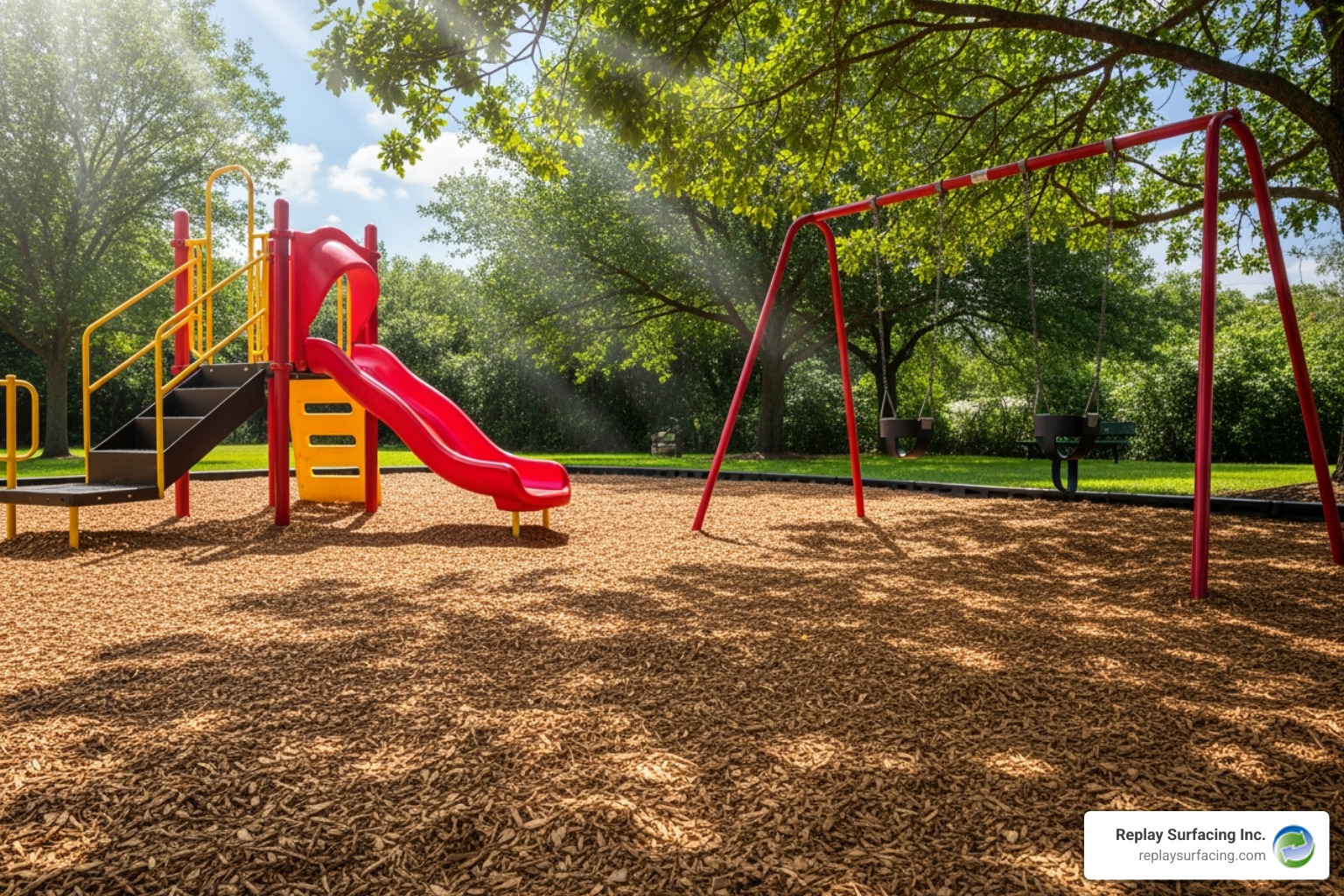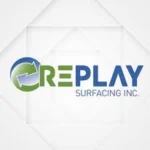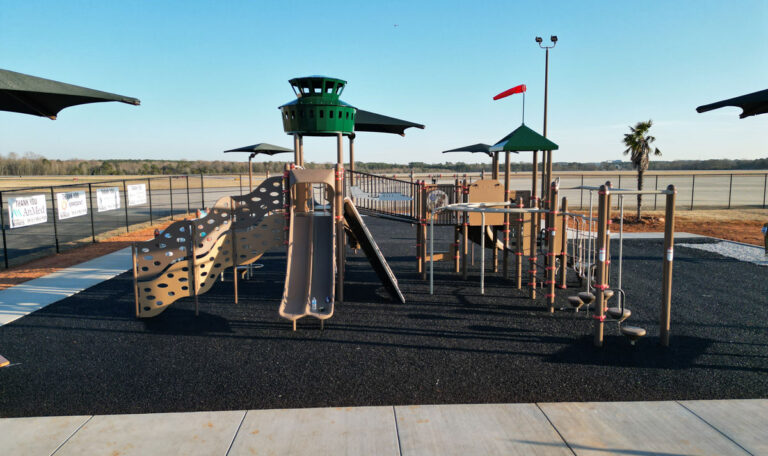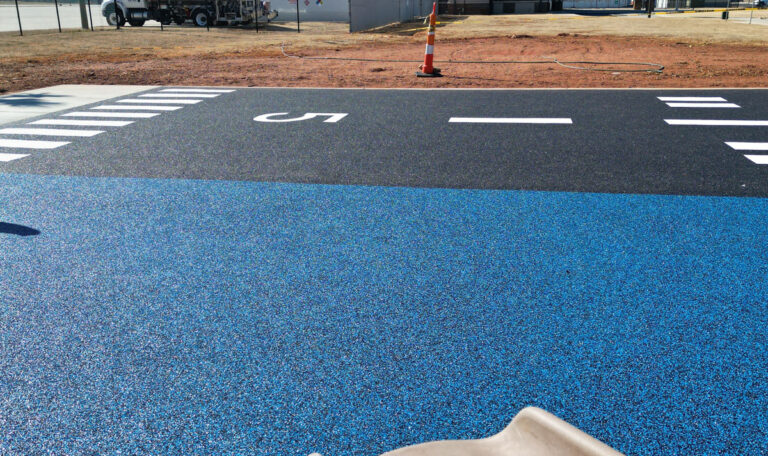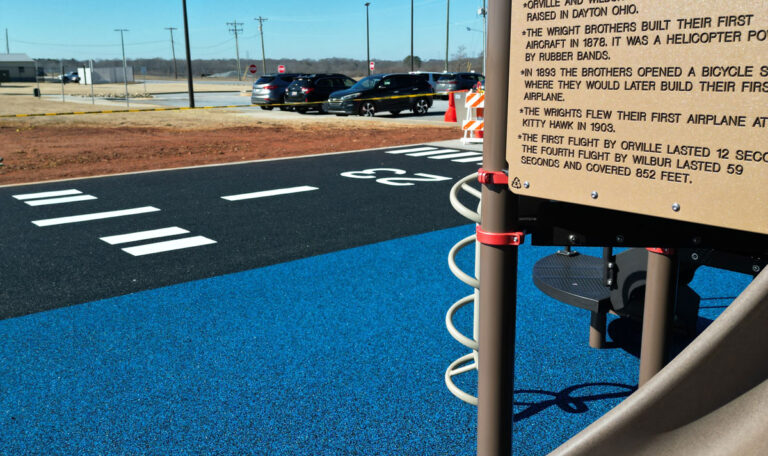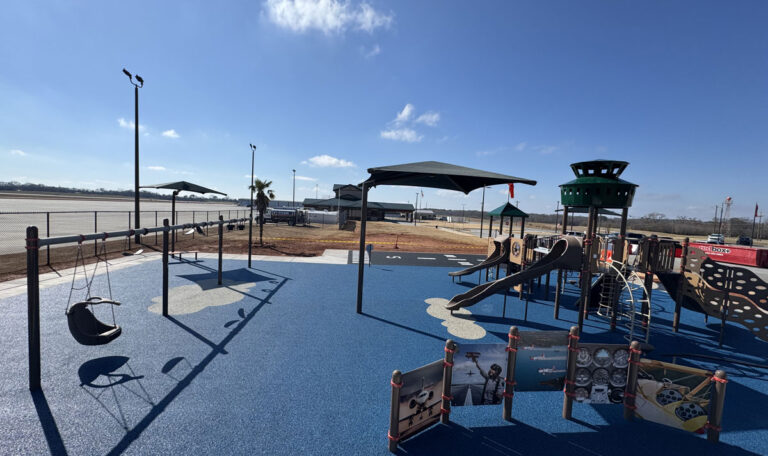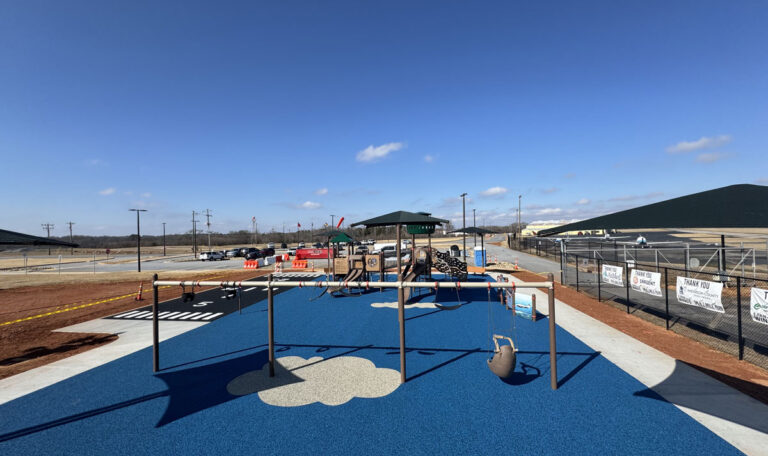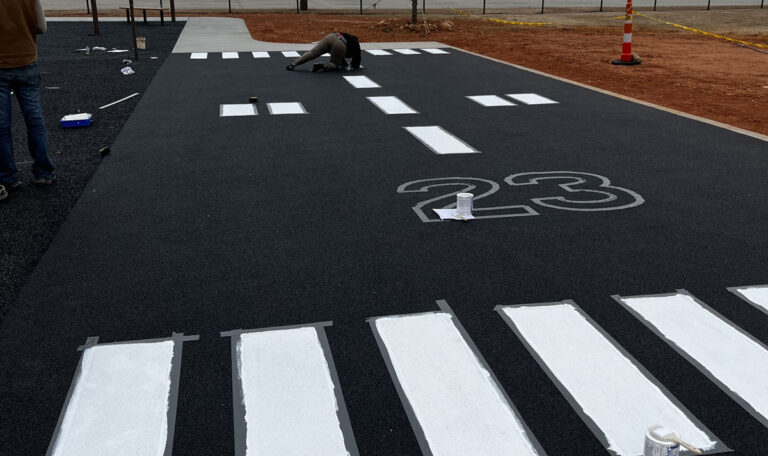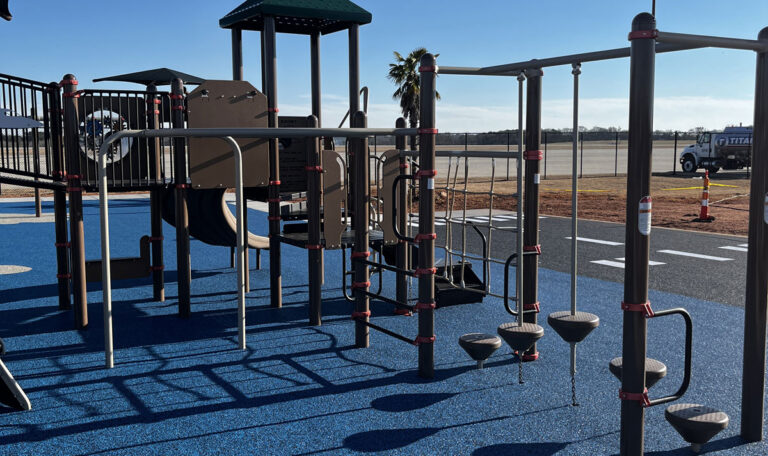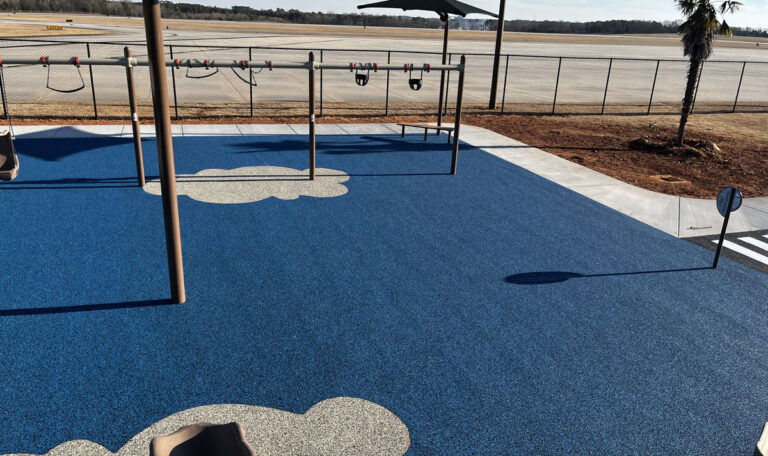Why the Right Playground Mulch in Nashville is Non-Negotiable
The right playground mulch in Nashville is your first line of defense against the 200,000+ playground injuries that occur annually. With falls accounting for nearly 75% of these incidents, the surface you choose can mean the difference between a minor tumble and a serious head injury.
Top Playground Mulch Options in Nashville:
- Recycled Rubber Mulch – Superior shock absorption, 10+ year lifespan, minimal maintenance.
- Engineered Wood Fiber (EWF) – Natural look, lower upfront cost, but requires high maintenance.
- Sand & Pea Gravel – Not recommended due to significant safety concerns.
As playground equipment gets taller, the ground remains just as hard. Proper shock absorption is critical. Your surface must also perform in diverse climates, from Charlotte’s humid summers and Tucson’s desert heat to Raleigh’s freezing winters, where traditional materials can fail.
I’m Landon Olson of Replay Surfacing. My work focuses on changing scrap tires into high-quality, safe playground mulch. With an engineering background in safety surfacing, I’ve seen how the right materials prevent serious injuries and create lasting value for communities.
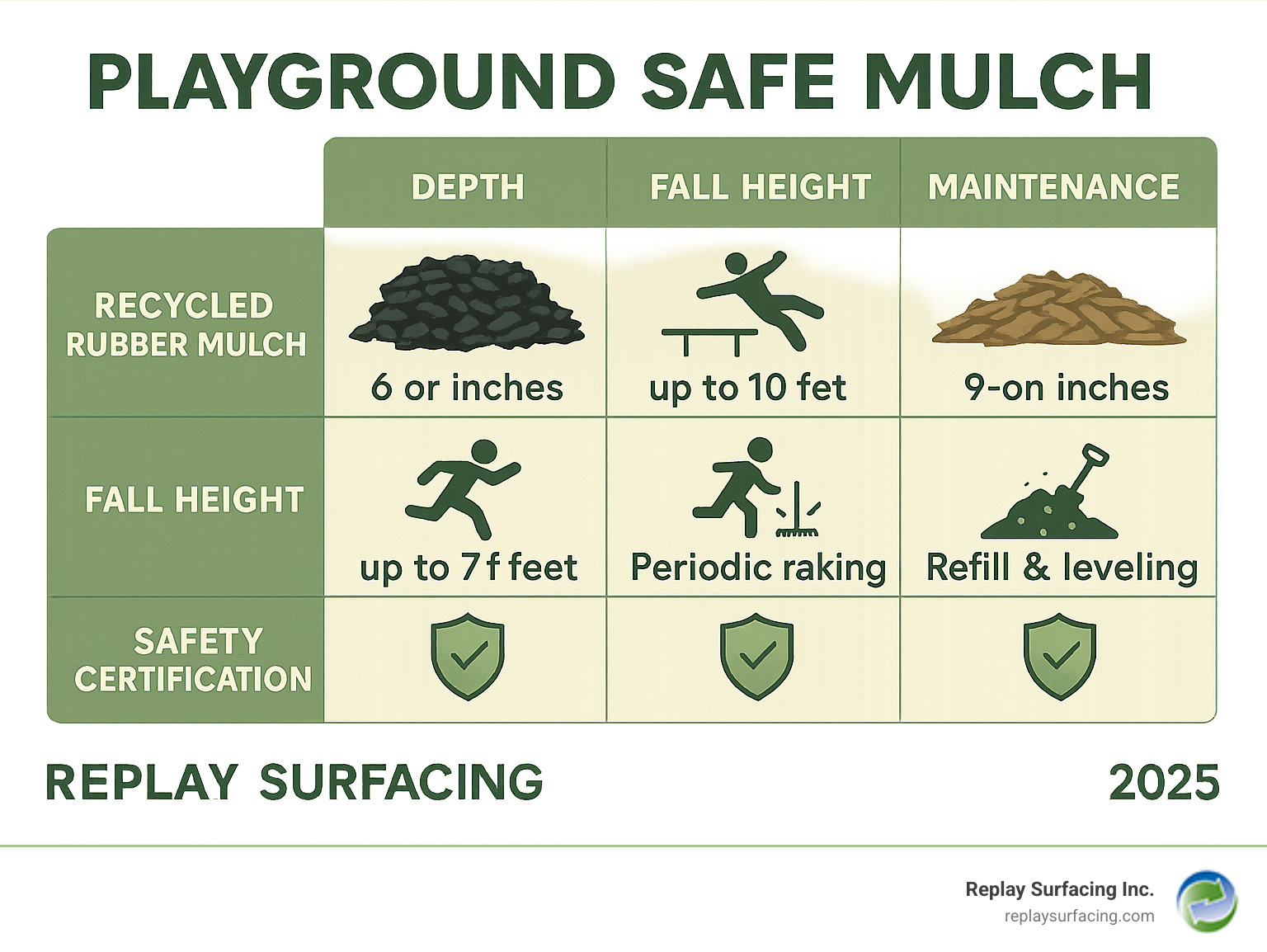
Simple playground mulch Nashville word guide:
Comparing Top Playground Mulch Options in Nashville
Choosing the right playground mulch in Nashville can feel overwhelming. After years of helping communities create safer play spaces, I’ve seen what works. Let me walk you through the main choices—and why one clearly stands above the rest.
Engineered Wood Fiber (EWF): The Natural Choice
Engineered Wood Fiber is made from virgin hardwood, processed into soft, fibrous strands. Its natural, rustic look blends well in settings like the wooded areas around Sanford, NC, and its lower upfront cost is attractive for budget-conscious projects in places like Columbia, SC.
However, EWF has significant drawbacks. It compacts over time, especially after rainstorms in Raleigh, which reduces its shock absorption and requires constant raking and replenishment. As it degrades, it can create splinters. In colder regions like Connecticut or Indiana, frozen EWF offers almost no fall protection. Being an organic material, it can also attract pests and grow mold, a concern in humid climates. These issues lead to high maintenance and a shorter lifespan, increasing long-term costs.
Recycled Rubber Mulch: The Safety-First Champion
At Replay Surfacing, we turn discarded tires into the high-quality playground mulch Nashville families trust, protecting children in communities from Nashville, TN, to Beaverton, OR.
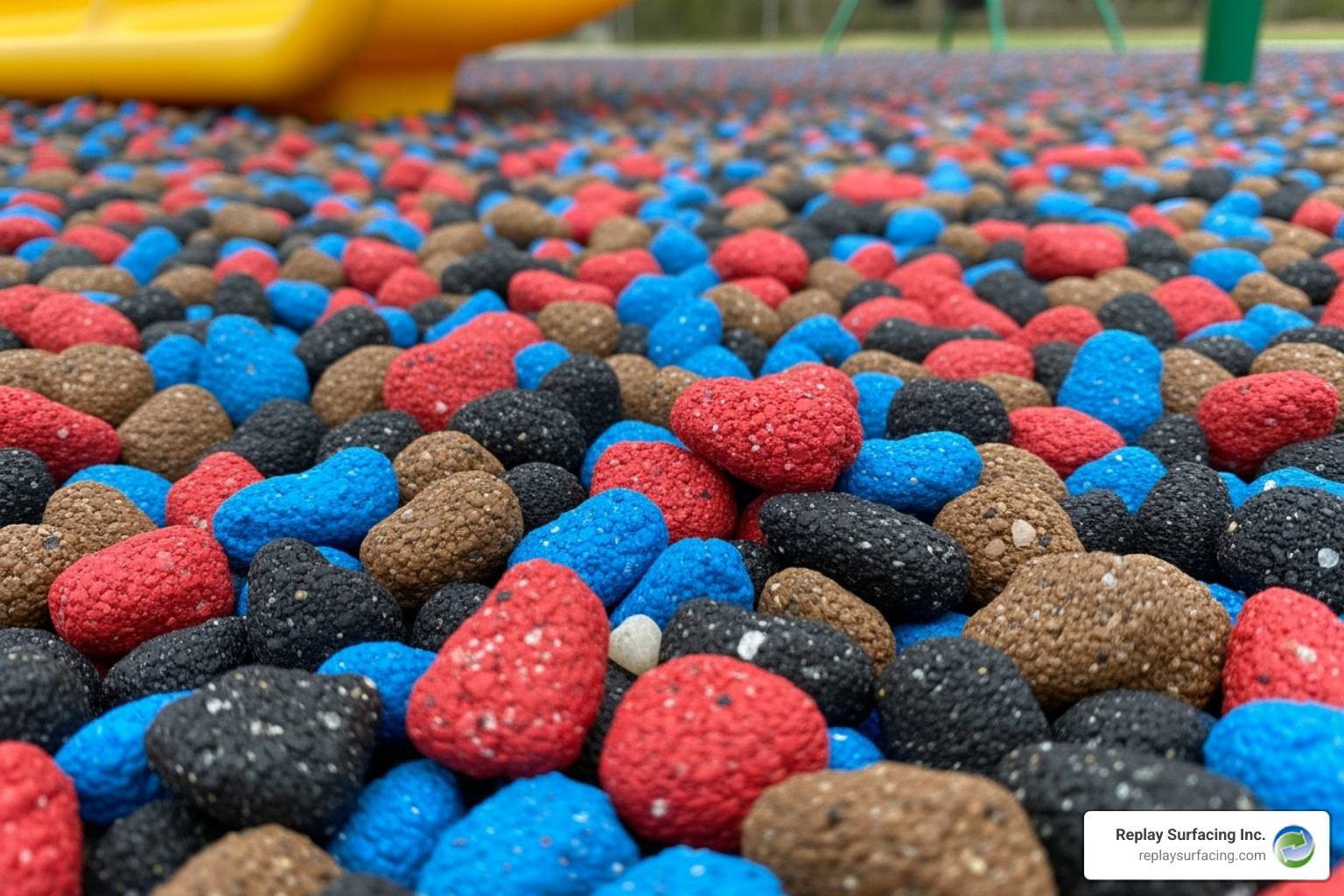
The safety performance of recycled rubber mulch is best. It offers superior shock absorption and lasts for over 10 years without compacting, rotting, or needing constant replacement. It drains quickly, so after rain in Lake Charles, Louisiana, play can resume almost immediately.
Maintenance is minimal. Rubber mulch stays in place, maintains its depth, and works in all weather—it never freezes, keeping winter play safe. It also doesn’t attract pests like organic materials do. By choosing our products, you’re also supporting sustainable construction materials, as we divert thousands of tires from landfills.
We understand parents have concerns. Our non-toxic rubber mulch is IPEMA Certified and 99.9% steel-free, meeting all national safety standards. While darker colors can absorb heat in sunny climates like Tucson, AZ, we offer lighter blends and recommend common-sense precautions on hot days.
A Quick Look at Sand and Pea Gravel
Traditional options like sand and pea gravel are not recommended for modern playgrounds for good reason.

These materials create more problems than they solve. Sand compacts into a concrete-like surface when wet, offering virtually no fall protection. Pea gravel is a choking hazard for young children and can hide sharp debris or animal waste. With falls accounting for nearly 75% of playground injuries, these materials simply don’t provide the reliable protection that modern engineered surfaces can.
Understanding Safety Standards for Playground Mulch in Nashville
Creating a truly safe playground means meeting rigorous safety standards that protect children. Think of these standards as your blueprint for building confidence into every play experience. When investing in playground mulch for your Nashville community, you want to know every specification has been tested and proven.
What are ASTM and CPSC Guidelines?
The American Society for Testing and Materials (ASTM) and the Consumer Product Safety Commission (CPSC) set the mandatory safety standards for playgrounds in the U.S.

- ASTM F1292: This is the key standard for impact absorption, measuring how well a surface protects a child’s head during a fall. Our recycled rubber mulch excels in these tests, giving operators in Columbia, SC, and Tucson, AZ, peace of mind.
- ASTM F2075: This standard applies to Engineered Wood Fiber, ensuring it’s free of contaminants and debris.
- Critical Fall Height: This is the maximum height from which a fall is not likely to cause a life-threatening head injury. Matching your surface to your equipment’s critical fall height is essential for projects in Raleigh or Lake Charles.
The CPSC recommendations for playground safety provide comprehensive guidelines, including specific surface depth requirements. We use advanced testing to ensure our products exceed these standards in all climates, from North Carolina to Arizona.
Why IPEMA Certification for Playground Mulch in Nashville Matters
The International Play Equipment Manufacturers Association (IPEMA) provides a crucial layer of third-party validation.
IPEMA certification confirms that an independent agency has tested a playground mulch for Nashville and verified that it meets ASTM safety standards. For communities in Beaverton, OR, or Sanford, NC, choosing IPEMA-certified products ensures they have passed rigorous, unbiased testing.
This certification is vital for verifying claims about non-toxic materials. Our rubber mulch is IPEMA-certified as safe for children and animals and is 99.9% steel-free. This provides parents with peace of mind and helps playground operators demonstrate due diligence. The Certified Playground Mulch – IPEMA program allows you to find products with genuine, verified safety performance, which is essential when making decisions for communities from Indiana to Louisiana.
Installation and Maintenance for Playground Mulch in Nashville
Choosing the right playground mulch in Nashville is only the first step. Proper installation and maintenance are essential for protecting children. The long-term performance and care requirements reveal the clear winner between mulch types.
| Feature | Engineered Wood Fiber (EWF) | Recycled Rubber Mulch |
|---|---|---|
| Initial Cost | Lower | Higher |
| Lifespan | 2-4 years (requires frequent replenishment) | 10+ years (single application) |
| Maintenance | High (frequent raking, leveling, topping off) | Low (occasional raking, debris removal) |
| Safety/Fall Protection | Good (when maintained at proper depth) | Excellent (superior shock absorption, consistent) |
| ADA Accessibility | Can be compliant (with proper installation/maintenance) | Can be compliant (stable, firm yet pliable) |
This comparison highlights the true cost of playground safety over time. While recycled rubber mulch has a higher upfront cost, its durability and low maintenance make it the smart choice for communities from Nashville, TN, to Beaverton, OR.
Getting the Depth Right for Your Playground Mulch in Nashville
Correct mulch depth is non-negotiable for child safety.
- Wood Mulch (EWF): Requires 9-12 inches. Because it compacts, especially in rainy climates like Lake Charles, Louisiana, or busy playgrounds in Charlotte, NC, you should start with 12 inches.
- Rubber Mulch for Playset: Needs only a 6-inch minimum for excellent protection due to its superior shock absorption.
Proper site preparation is key to performance. This includes clearing the area, grading for drainage (critical from Tucson, AZ to Raleigh, NC), installing a landscape fabric to block weeds, and adding a gravel drainage layer. A good foundation prevents water pooling and extends the life of your surface.
For detailed instructions, see our guide on installing rubber mulch.
Ongoing Care: Keeping Your Mulch Safe and Effective
Smart maintenance ensures lasting safety in dynamic play environments.
- Raking and Leveling: Regularly rake mulch to maintain proper depth, especially in high-impact zones like under swings and at slide exits. This is crucial after heavy use or in areas with harsh winters like Connecticut and Indiana.
- Compaction and Top-Offs: EWF compacts and requires replacement, while rubber mulch does not. EWF needs replenishment every 1-2 years; rubber mulch may need minor top-offs every 5-10 years.
- Debris Removal: Keep the surface clear of hazards. Debris is easier to spot and remove from rubber mulch than from EWF.
- Seasonal Care: Adapt your maintenance for the seasons. In summer in Nashville, TN, monitor depth as play increases. In fall, clear leaves to prevent pests.
- High-Traffic Mats: Use rubber playground mats under swings and slides to prevent mulch displacement, reduce maintenance, and improve safety.
Proper maintenance creates a play environment where children can explore with confidence.
Frequently Asked Questions About Playground Mulch in Nashville
Parents and playground operators from Nashville, TN to Beaverton, OR, often ask the same thoughtful questions about playground mulch in Nashville. Here are the answers to the most common concerns.
How deep does playground mulch need to be?
Proper depth is critical for safety. The required depth depends on the material and the fall height of your play equipment.
- Engineered Wood Fiber (EWF): CPSC recommends 9 to 12 inches. Because EWF compacts, especially in high-traffic playgrounds in cities like Charlotte, NC, it’s best to start with 12 inches and monitor it regularly.
- Recycled Rubber Mulch: A minimum of 6 inches is needed for excellent protection. Its superior shock absorption means less material is required for the same or better safety.
We help playground operators in places like Raleigh, NC, match mulch depth to their specific equipment. Maintaining the correct depth is an ongoing process essential for safety. For more details, see our guide on rubber mulch for playset.
Is recycled rubber mulch toxic or unsafe for kids?
Yes, high-quality, certified recycled rubber mulch is safe for children. Here’s how we ensure it:
- IPEMA Certification: Our products are certified by IPEMA as non-toxic to both animals and children, meeting strict ASTM safety standards through third-party testing.
- 99.9% Steel-Free: We guarantee our mulch is 99.9% free of steel, eliminating the risk of sharp metal fragments.
- Low Chemical Risk: EPA studies confirm that exposure risks from quality recycled tire products are very low. Our clean processing and rigorous testing ensure a safe product.
- Heat Management: Darker rubber can get warm in sunny climates like Tucson, AZ. We offer lighter color blends and recommend standard heat precautions.
For another certified safe option, consider our non-toxic playground tiles.
Which is more cost-effective in the long run: wood or rubber mulch?
While engineered wood fiber has a lower upfront cost, recycled rubber mulch is far more cost-effective in the long run.
- Wood Mulch (EWF): The initial price is lower, which can be appealing for projects with tight budgets in places like Indiana or Connecticut. However, EWF requires replacement every 1-2 years due to compaction and decomposition, especially in climates like Lake Charles, Louisiana. These recurring costs for material, delivery, and labor add up quickly.
- Rubber Mulch: A single installation lasts 10+ years with minimal maintenance. It doesn’t decompose or compact, saving significant money over time.
When calculating the total cost of ownership over a decade for projects in Columbia, SC, or Sanford, NC, rubber mulch is typically the more economical choice. It provides better long-term financial value and superior, consistent safety. To learn more, read our guide on understanding rubber playground surfacing costs.
Create Your Safest Nashville Play Area Today
Choosing the right playground mulch in Nashville is a critical safety decision, especially since falls cause 75% of playground injuries. The surface under the equipment is your most important safety feature.
While Engineered Wood Fiber offers a natural look, its constant maintenance, frequent replacement, and declining safety performance make it a costly long-term choice, particularly in climates found in Lake Charles or Connecticut.
Recycled rubber mulch is the superior option for long-term safety and value. Its 10+ year lifespan and minimal maintenance give communities from Nashville to Beaverton peace of mind. At Replay Surfacing, we’re proud to transform environmental waste into safe play spaces. When families in Tucson or teachers in Raleigh feel confident about playground safety, we know we’ve succeeded.
Our IPEMA-certified rubber mulch provides consistent, reliable protection, so you don’t have to worry about falls or budget for constant upkeep. It’s a win for child safety, community budgets, and the environment.
Ready to build a playground where children can play fearlessly? Whether you’re in Columbia, SC, or Sanford, NC, we can help.
Explore our safe and sustainable playground surfacing options and create the playground your community deserves.

